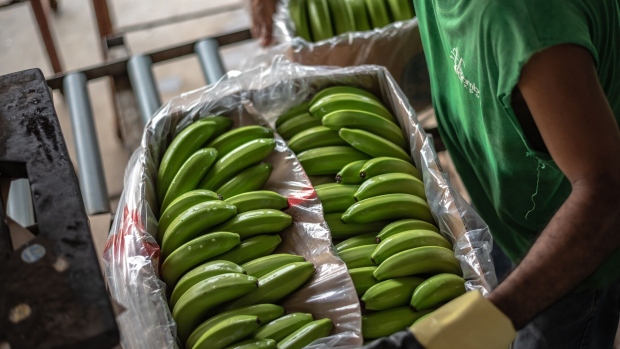Feb 16, 2024
Russia Blinks on Banana Ban as Ecuador Swaps Weaponry With US
, Bloomberg News

(Bloomberg) -- Russia lifted a ban on five Ecuadorian banana exporters, resolving for now a dispute over the Latin American nation’s swap of decades-old weaponry with the US.
Ecuador, the world’s biggest banana exporter, solved the impasse “with little noise and quickly thanks to a capable career commerce team,” said Michel Levi, a professor of foreign relations at Universidad Andina Simon Bolivar in Quito.
Alleging pests in shipments earlier this month, Russia’s agriculture and food safety watchdog had banned companies that account for about a fifth of Ecuador’s annual exports of the fruit to the Eurasian country. The tiny Megaselia scalaris flies are harmless and were only reported in 0.3% of cargoes, according to Ecuador’s banana exporters’ association.
With the end of the ban, President Daniel Noboa — a millennial heir to a banana fortune — chalked up a second foreign policy victory in a week after Ecuador’s national assembly ratified a free-trade agreement with Russia’s ally China.
“This decision is proof of the importance of dialog that must exist at all times between two countries that traditionally have had a very close and very positive relationship,” Ecuador’s ambassador to Russia, Fernando Holguin, said in a video distributed by the foreign ministry.
Embroiled in a bid to neutralize rampaging narco gangs, Noboa plans to receive $200 million in new US weapons in exchange for “scrap” Russian arms from the 1990s. Washington intends to ship the weaponry to Ukraine as it battles for global influence and rallies allies to that country’s defense in its war with Russia.
A Ukrainian transport plane that landed in Guayaquil last month has already brought “international cooperation,” according to Admiral Jaime Vela, the head of Ecuador’s joint chiefs of staff.
Russia harshly criticized the swap. The 36-year-old Noboa made a “reckless decision under serious pressure from external interested parties,” foreign ministry spokeswoman Maria Zakharova said last week.
Ecuador’s strongest period of ties with Russia was under former President Rafael Correa, who lives in exile in Belgium after being convicted of corruption and has a talk show broadcast by Kremlin-backed television channel RT. During his time in office, Correa pivoted toward Venezuela and Cuba while granting diplomatic asylum to Wikileaks founder Julian Assange after the expulsion of a US ambassador.
A decade earlier, Ecuador bought several helicopters from Russia. While Moscow argues the South American nation can’t legally transfer the weapons to a third party without written approval, they are currently grounded, so “if it is not operational, Ecuador can scrap it, sell it, give it away or exchange it,” Foreign Minister Gabriela Sommerfeld told reporters in Quito last month.
Sommerfeld met with Russian ambassador Vladimir Sprinchan to discuss the dispute on Feb. 5, with Russia’s embassy reporting a “frank environment” for the talks.
On Thursday, Noboa ratified two military agreements with the US, completing deals negotiated under his predecessor, Guillermo Lasso. As a junior lawmaker in September 2022, however, Noboa was part of a trade delegation to Russia bankrolled by his father’s banana corporation and during the visit he appeared to be undermining Lasso’s policy of condemning the invasion of Ukraine.
Noboa’s personal contacts in Russia were likely decisive on the banana issue as “other governments would have been very nervous and he didn’t bat an eyelash,” according to Levi, who also holds a World Trade Organization chair.
©2024 Bloomberg L.P.





